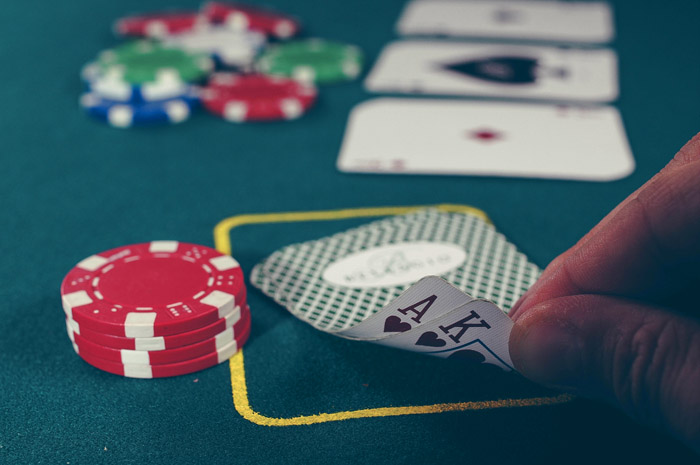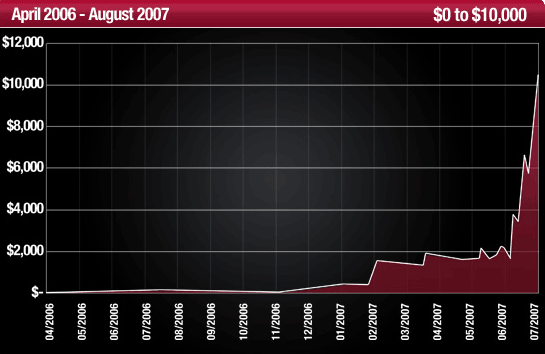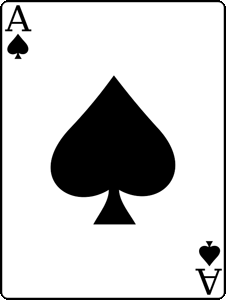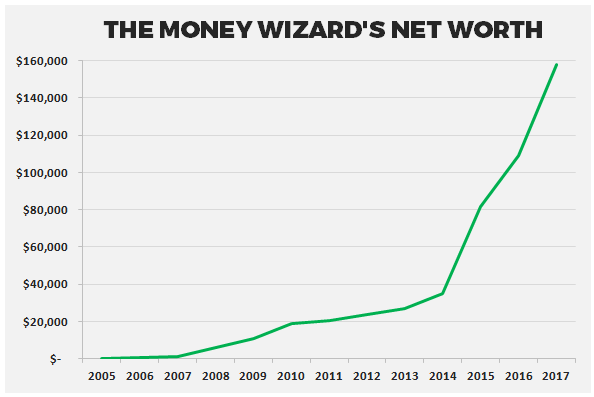
Back when online poker was legal in this country, I was an avid player.
Wait, I’m being told online poker might not have ever been legal. A gray area is more accurate. In which case, the remainder of the article is about my entirely fictional friend.
Anyway, at the time I was fascinated by the story of professional poker player Chris Ferguson. Chris, a five time World Series of Poker Champion, posed a simple question. Starting from absolutely nothing, could a professional poker player stay disciplined enough to slowly build up a bank account?
Chris implemented a strict set of rules to keep himself on track, and then set out at the lowest stakes games against average players. From behind a computer screen, online players had no way of knowing they were playing against one of poker’s most successful players of all time!
The result? After a year and a half, Chris grew his poker account’s balance from $0 to $10,000:

Feeling inspired, and being a bored college student desperate to procrastinate away my assignments, I implemented a similar set of rules with surprising success. I started with $0 to my name, started grinding it out in a bunch of free tournaments hoping to place high enough to win a few cents, then fought tooth and nail to try to grow those winnings.
After several months and far too many hours staring at the pale hue of a computer screen, I walked away with a little over $100 to my name. For those calculating along at home, that’s an infinite return on investment. Take that Warren Buffet!!!
As I’m now older and wiser (or at least as wise as a 26-year-old with a marginally-successful blog about money can be) I started to recognize the enormous parallels between the game of poker and the game of life.
Specifically, the money game.
While poker is a game taking place on dimly lit felt tables (or in my case, a dimly lit computer screen) in cardrooms and casinos, the money game is all around us. The money game is taking place every day at your job, your bank, the mall you go to, and during every deal agreed upon by each and every one of us.
Surprisingly, poker can teach us quite a bit about how to win this money game.
The Game of Money
Poker lingo has an old school term for players. Bad players are known as fish, and good players are known as sharks.
The sharks eat the fish.
(Sometime during poker’s history, the term fish got replaced by “donkey,” which I find far more hilarious.)
If you can’t find the sucker at the table, you’re it.” –Warren Buffet
Finance is just like a poker table, but instead of cards and chips, we’ve got loans and bank accounts.
Some people lose the game of money, some people win, and some never even give themselves a chance to play it.
Someone constantly spending and constantly in debt never gives themselves a chance to start their investment journey. They haven’t even left square one of the Monopoly board. They’re the sucker.
With his eyes wide shut, Mr. Big Spender is feeling good about how he’s “winning the game.” Just look at his fancy car and fancy watch to prove it.
Meanwhile, behind the scenes, the real sharks are eating him alive.
As Mr. Big Spender hands over another hard earned paycheck for his luxury car or fancy watch, the real players are happily taking that money and lining their pockets. They’re using his money to invest in productive assets and growth their wealth. They’re focused on creating businesses, gaining passive income, and reaching freedom. They’re winning the game.
Avoid the traps of consumerism, and give yourself a chance to win the game by saving enough money to start investing.
Anything Can Be Learned
When I first started playing poker, I couldn’t tell you a spade from a club.

Then I found 6 of the best poker books, and I read them from cover to cover. What I learned was three-fold:
- Those trees are actually called clubs: And those arrow looking things are spades.
- Anything can be learned: I was amazed to find that studying doesn’t just get you better grades in school, but it can also earn you cold hard cash. After each book, I noticed a marked improvement in my poker game. When I reached the end of my mini poker library, I had gone from a clueless player to someone who could consistently hold my own at poker night with my friends, and was turning a small profit online.
- Most people don’t research anything: Low stakes poker tables are full of players who don’t know the basics of the game. The number of people who will jump head first into anything, whether it be poker, investing, owning a pet, or buying a house, without doing a moment of research, never ceases to amaze.
A little bit of studying can put you at a huge leg up. Always consider the power of research, either from books, online, or even blogs about Money Wizards, before risking any of your hard earned money.
Investing Is About Playing the Odds
Professional poker is about more than having some superhuman ability to read a Poker Face. In fact, most players will tell you their most useful skill is actually quickly calculating their estimated odds, then consistently and repeatedly making the right move given the odds.
Statistics are never perfect. If you’ve ever flipped a coin heads several times in a row, you can relate. Even after making the perfect statistical play, there’s an element of chance.
Sometimes the poker player wins, sometimes they lose. Yet over a long enough time, making the right bet should pay off. The good player tilts the odds in their favor, and knows that making the correct choice with enough consistency will cause them to come out ahead.
Investing is no different. We will always have unknowns in life, and in investing. This means some investments make money and some do not. But following tried and true investing strategies tilts the odds in our favor. Just like the professional poker player pushing his chips in when the moment’s right, over time, the majority of our well calculated investments will pay off.
My Net Worth Updates show how some months I make money, and sometimes I lose money. But investing is a marathon, not a race. Because I’ve bet on the odds, over a long enough time statistical anomalies smooth themselves out, and a sound portfolio continues its upward march of wealth creation.
Controlling Risk
Once the basics of the poker game are mastered, risk management is one of the most important tools in a player’s toolbox. Funnily enough, any serious investor will tell you the same thing.
“Bankroll management” is the term used in the poker world to describe controlling risk, and bankroll management was the key to Chris’s $0 to $10,000 challenge. This meant sticking to one simple rule:
Always Diversify!
The golden rule of Chris Ferguson’s $0 to $10,000 challenge was simple: never risk more than 5% of your portfolio at any time.
This meant never sitting down at a table with more than 5% of your poker net worth, while also forcing yourself to walk away in the event of a bad beat. This not only limits your risk of losses and allows “good plays” to more consistently march that account balance upward, but the rule also eliminates the most difficult and emotional part of gambling: walking away.
This rule is not at all limited to gambling poker players and their crazy challenges. Good stock investors would be wise not to risk more than a set percentage on any trade. And when analyzing balance sheets while working at a bank, I noticed wealthy real estate investors adhered to a similar 5-10% rule – never risking more than a set percentage of their net worth on any deal, no matter how glamorous it looked.
You Can Take More Risk When You’re Young
The one exception to the 5% rule? The very early stages of the challenge.
For example, when my total poker bankroll was just 10 cents, it was impossible to bring just 1 cent into a game. There aren’t even tables that small!
I had no choice but to be more risk taking, which is very much like life itself. (Seeing a trend with this article yet?)
When you’re young and beginning the investment game, you can risk more, simply because you have less to lose. Not only do you probably have less family obligations, as a young investor you also have time on your side. With years of investing ahead of you, you can ride out any waves or recover any losses.
Growth Is Exponential
I’ve harped on the beauty of compound interest before, but there’s nothing quite like playing hours of poker just to win a whopping 3 cents to really drive the point home.
We can obviously see exponential growth in the graph from Chris Ferguson’s challenge:

My own net worth progress is similar. It took me almost 10 years to build my net worth to $100,000, then in just 1 more year I had added another $50,000. Here’s a graph of my net worth over time, to the best of my memory:

The power of money is surpassed only by the power of exponential growth. Put the two together, and the results are truly amazing.
Become a Shark in the Game of Money
Poker is a game of chance, yet it’s also a game of skill. Life is no different.
We can’t control the hand we’re dealt nor can we plan for every variable. But we can strategically position ourselves for the best chance to win the game.
Don’t be a donkey. Step back and look at the rules of the game, then use them to place yourself firmly in the winner’s seat.
Your move.
_____________________________


Very well written! I play poker very seldomly, but I can visualize all of the ways it can apply to personal finance.
Funny enough, even though I played, I hadn’t quite thought of it that way until you tied it in.
Thanks! There are so many carry-overs between the two. In fact, the mindset and characteristics of a good investor (patience, discipline, planning, calculated risk, etc.) can benefit almost every area of life!
Out of curiosity, did something change in your situation during 2014? Seems like a noticeable change in the upward trend 🙂
2014 was my first entire year of full time employment after I graduated college. The boost from part time jobs and internships to a full time, post-grad salary certainly boosted my savings rate.
The fact that most people don’t research anything blows my mind! You can see it in how normal people book vacations to buy things online. I probably go a little extreme in the other direction and will google something for 4 hours to save $20 but it’s still crazy!
Haha so true Julie. I definitely tend to take it to an extreme. I recently searched the internet high and low to save $2 on a bottle of hot sauce. Definitely not the best use of my time, and I could have used a little bit of that non-researching, headfirst spirit which I will never understand.
I like the graphs and the analogies. I’m starting to see the exponential growth on my investments were investment growth is making up a noticeable portion (~15%) of my net worth.
It pretty cool the amount you were able to save while in University. I worked my ass of during school so graduated with no debt but i think i had under 200 bucks in my bank account at 22 when i finished – 26 now. I have been tracking at a little lower rate than you since graduation – your savings rate and updates are a good friendly competition for me. Ill see I can get closer to 50%.
Just curious – how much comes out of your paycheck automatically every month and gets put in to long term saving vs what you do manually? I do about 1900/month on autopilot then top up every few months when my saving account gets too high.
No doubt, I was definitely fortunate to have scholarships and help from family throughout college. I’ll never downplay the enormous head start this gave me coming out of school, and it’s something I hope to pass on to my kids in the future.
Right now everything is all wonky because I’m trying to kill my car loan, but in a normal situation it sounds like you and I have similar strategies. I normally contribute about 25% of my pre-tax salary to max out my 401K, then every few months whenever my checking account gets too high, I throw a couple grand into my Vanguard account.
Glad to hear you’re starting to see the snowball start!
Awesome article. I was also an avid poker player in highschool and into college.
My best day ever was playing blackjack where I went up $800 and ending up walking away with $200. It’s always good to set limits and know when to walk away.
Another parallel is keeping emotions out of it. Investments should not be checked everyday, the real winners are long term investors every time.
Great point about emotions and not checking investments too often.
I feel like I’m even pushing it with my monthly net worth updates. People seem to enjoy them though, so I’ll keep checking every month, even if a month is just a blip on the investing time scale.
Your post reminded me of the good ole days when I would grind all night on PokerStars and FTP playing small stakes MTTs with the dream of running deep in a big Sunday tourney one day. Miss those days.
Your right, so many good lessons to be learned from poker, from playing “Tight aggressive” to developing BR management to pot odds. All can apply to other areas of investing/life.
Also, there are so many different aspects of the game that can be learned. Sit and Goes, Cash games, MTTs, short-handed, No Limit/Pot Limit, etc. In investing, there’s Investing in Retirement accounts, real estate investing, owning your own business, etc. All different avenues you can take that can get you to the same end goal.
I love the comparison.
Haha, you’re making me all nostalgic over here! Definitely miss those MTTs.
Great point about all the different investment paths that can be learned and used to grow wealth.
I like the analogy. I’ve never done much beyond the occasional poker game with friends, but I do understand that statistics and at the extremes card counting can make you an infinitely better player. Then again there is the aspect of opportunity cost, given I play one game a year for pennies, its probably not worth an hour to learn poker. On the flip side if I invested hundreds of hours I better read up. It’s a balance.
Definitely. And although I’m firmly convinced poker can be learned and profitable for some people, I’m not advocating anyone go out and try to use poker as a legitimate side hustle. There’s no question it’s still a wild roller coaster and there’s a bigger element of chance than smart investments. Much better to devote the time to learning about stocks, real estate, etc.
Oh man. I miss online poker. Those were the days. I used to grind on Pokerstars all the time. $3/$6 limit and $2/$5 NL were my games. This post made me miss it. Poker and investing are very similar – the more you study the more you realize you can learn! I got about halfway through Super System and was so overwhelmed! Thanks for sharing.
Haha, same here. I definitely miss those days, and I got a little nostalgic as I was writing this one up!
This is a great post! Nostalgia is easy, but teaching a good lesson with it is priceless!
I wonder if poker strategies may deviate from the norm if there was, say, a FinCon poker tournament. How much more conservative might the tables be based on the typically risk-averse nature of the players? Or how much more loose might the tables be because “Hey, it’s amongst friends, and I don’t need this money anyway!”
Very interesting thought. I’d bet the PF community plays a much tighter game than the typical poker player – I know I always had a very conservative strategy.
Considering the average PF blogger can’t stand overpaying for lunch, I’d imagine we’d all be really tight with poker money on the line!
You are well on your way my friend! Found my way to your blog because of the poker angle and I’m glad I stopped by for the interesting read. I’m a bit older than you, and what is interesting is that my poker playing days came about in the exact opposite way. I was fortunate enough to figure out the simple ways to get ahead financially at a very young age and when I began my poker journey it was just another way to have some fun and make some easy money. I didn’t trust those online poker sites, so when I started playing I just wanted to see if I could win money in a free roll (no way was I going to give them my hard earned money or heaven forbid, my credit card!). So like you, I grinded away until I earned a whopping 90 cents!! Once I had that, I took some time to figure out how to build it. My strategy was to do what I’ve always done in my financial life; be patient, calculate my odds, pay myself first, be frugal, educate myself, etc. Long story short, I managed to cash out nearly 7k over a two year span (starting from $0.00). I was starting to hit my stride and found my niche when the rug was pulled out from under all of us. Fortunately I got to cash out my $500 balance from poker stars, but unfortunately lost out on $300 from full tilt (glad I was cashing out from time to time). It was all free fun money for me, so I guess it was no big deal. Anyway, it makes me smile to see youngsters like yourself take financial responsibility at a young age. You’ve got the snowball going and trust me, if you keep doing the right things, it gets big very quickly!!
Amazing progress! $7K… you almost had Chris Ferguson beat!
I too lost on the Full Tilt deal. I had about $40 of my $100 of winnings in there when the rug was pulled out, and I never did get that money back.
Thanks for sharing your story, and I love hearing your insight. Hope to see you around some more!
What were the 6 poker books that you read?
Harrington on Hold ’em by Dan Harrington
Super System by Doyle Brunson
No Limit Hold Em by David Sklansky and Ed Miller
Winning Low Limit Hold Em by Lee Jones
Every Hand Revealed by Gus Hansen
Kill Everyone by Lee Nelson
I am very impressed the way you have explained the things especially the analogies. It is very important that if you are playing poker or any other casino game, then you should look after your investment.
Your Bankroll plays a very very important role and always emotions should be kept aside. Also, its a game, sometimes you loose and sometimes you win. So, always play your game with your full concentration so that you can’t regret afterwards.
Very well written!!!!